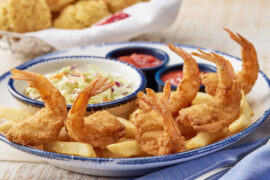Pete Ward has stepped down from the helm as chief executive of Young’s Seafood Limited, a position he has held since July of 2015. Bill Showalter, ceo of parent company Young’s Seafood International Holdings, has assumed his responsibilities for an interim period, until a new chief executive is announced.
The decision to implement a change in leadership and governance followed the completion of a strategic review of Young’s led by Ward. It has focused the business on driving top line growth through new commercial strategies, innovation and a greater emphasis on foodservice and exports.
“Having put the plan into action, championed the company’s virtual integration strategy and established a strengthened and expanded operating board capable of delivering new strategy, Pete now wishes to pursue opportunities outside of Young’s to promote the UK seafood industry as a whole,” according to a statement posted on the Grimsby, England-headquartered company’s website.
 Ward has dedicated his entire working life to the fish and seafood industry, including 24 years in board level positions. He joined the company that is now Young’s Seafood Limited in 1978, and was managing director of the Seafood Company, Britain’s largest seafood business in 2008, before it became part of Young’s.
Ward has dedicated his entire working life to the fish and seafood industry, including 24 years in board level positions. He joined the company that is now Young’s Seafood Limited in 1978, and was managing director of the Seafood Company, Britain’s largest seafood business in 2008, before it became part of Young’s.
“My commitment to the seafood industry, and the local communities in which we are located, continues to be important to me and I will now be able to dedicate more of my time to these priorities,” said Ward.
Showalter, who joined Young’s in 2013 and was named chief executive officer of Young’s Seafood International Holdings in January of 2016, commented: “Our company is the number one UK seafood processor, and Pete’s vision and drive have been invaluable in achieving this success. Our focus continues to be on inspiring people to love fish now and for generations to come, and on providing great service to our customers and consumers.”
It’s been rough sailing for Young’s Seafood recently, as it lost a major private label contract for packing value-added salmon products to Marine Harvest. Results for the quarter that ended on April 2, 2016, show a sales decline of 17% to £120.5 million. Gross profit dropped 38% to £9.3 million, with gross profit margin slipping from 10.3% to 7.7%. EBITA declined 42% to £5.2 million, compared to the like period in 2015.
On the positive side, last year the company saw operating profit increase £1.5 million to £26.7 million on sales of £587.9 million.
Since last autumn Young’s has worked on more than eight projects with its suppliers, generating over £500,000 of savings. These savings have been reinvested into innovation, which retailer customers and shoppers will benefit from when new products become available in stores soon.
Young’s partnership with the Alaska Seafood Marketing Institute to promote fish fingers with a “Free Swim” on-pack offer is just one example of a successful joint project, which has so far resulted in many families going swimming and enjoying Young’s Omega 3 fish fingers made with Alaska pollock.
A number of suppliers have seen an increase in turnover since taking an active role in Young’s virtual integration strategy, with at least one recording a 60% rise in sales driven by innovation and new product development.





